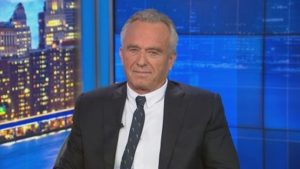As Robert F. Kennedy Jr. gains influence in Washington, proposed reforms targeting pesticide use and vaccine safety are causing anxiety among corporate lobbyists, with the potential to reshape the food and health industries significantly.
Shifting Plates: Robert F. Kennedy Jr.'s Policy Push Disrupts Food and Health Industries

Shifting Plates: Robert F. Kennedy Jr.'s Policy Push Disrupts Food and Health Industries
New regulatory reforms championed by RFK Jr. threaten traditional practices in health and food sectors, leaving industry leaders in uncertainty.
The health and food sectors are on edge as Robert F. Kennedy Jr. seeks to implement transformative regulatory reforms, a move that could reshape industry standards nationwide. His proposals—which include strict pesticide regulations and a thorough review of vaccine safety protocols—are raising alarms among lobbyists and corporate leaders concerned about their profit margins.
Kennedy's strategies are ambitious; they encompass a ban on processed foods in schools and a comprehensive restructuring of federal agencies overseeing food and health regulations. This tightrope walk between public health and corporate interests places billions in potential revenue at stake, provoking anxiety primarily on K Street, where companies scramble to decode Kennedy’s intentions and adapt.
Amidst this storm, John Strom, special counsel at Foley and Lardner, observed the current sentiment among business leaders as one of caution mixed with apprehension. “A prudent wait-and-see strategy is in order,” he advised, recommending that clients adopt a non-confrontational approach towards Kennedy that would prevent any early hostility. This advisory stance highlights a larger tactical response from lobbyists who are advocating for patience while they evaluate new developments.
The implications of Kennedy's reformative measures extend into the agricultural sector, where stricter pesticide regulations stand to disrupt long-established practices and profits. Additionally, a probable ban on ultra-processed foods in educational institutions could instigate a fundamental reshaping of food production and distribution. Kennedy's campaign to reevaluate vaccine safety also casts a shadow of uncertainty over the healthcare industry, complicating efforts to maintain public trust.
As these potential policy shifts become more tangible, companies are actively seeking to build connections with Kennedy, hoping to mitigate projected impacts on their operations. Establishing a collaborative rapport seems paramount for many, as Strom remarked, “Businesses are wary of beginning this relationship on a contentious note.”
In light of President Trump’s recent proclamations catalyzing support for Kennedy's platform, the stakes are ever higher, and industries are navigating uncharted waters. Lobbyists are inundated with inquiries from clients eager for direction, yet one truth remains evident: the ripple effects from Kennedy’s proposed reforms are already unsettling the established order. The path forward and the likelihood of these policies being enacted remain uncertain, but the implication of a potential upheaval within health and food sectors looms large.






















